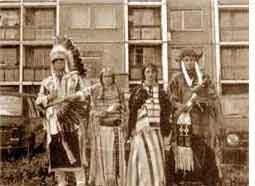It seems like an outbreak of Central European insanity, not unlike the craziness that tore apart Czechoslovakia shortly before this 1995 film was completed.
Here are blond Europeans wearing loincloths, piling into sweat lodges, playing lacrosse, sporting feather headdresses, practicing archery and beating drums in what looks to be a passionate hobby taken a little too far, like habitual knitting or the restaging of Civil War battle scenes.
But director John Paskievich gives this Canadian documentary a fascinating depth, uncovering European isolation and the touching search for connection by a generation of disaffected people.
Paskievich follows Joseph and Irene Young, Crees from Manitoba, and Barbara Daniels, an Ojibwa from Winnipeg, who have traveled to see the life of their ancestors re-created in a European forest.
The earnest Czech practitioners, now free after the fall of communism, explain that they are refugees from their own society, originally brought together years ago by their fervent anti-communism. Coming from a society so destroyed by the institutionalized isolation, distrust and spiritual bankruptcy of their government, they chose to emulate a culture that focused instead on interdependency and mutual trust.
“We got together originally as anti-Communists completely disillusioned with the way things ran in our country,” one explains. “We didn’t vote and we generally ignored civil duties because we were fundamentally opposed to the way things were run. The Indian Movement provided something that was wonderful.”
So here is Daniel Hoffman, known as Big Eagle, and Milos Ekstien, called Running Bull, explaining that their are several thousand Czechs involved in Indian culture. One member of the “tribe” after years of study, actually speaks fluent Lakota.
The visiting North American Indians were duly impressed.
“We’re natives and we’re dressed like Europeans and they’re Europeans and dressed like natives,” said Irene Young. “I felt: What’s wrong with this picture?”
One thing that isn’t wrong is their attitude toward man’s responsibility to fellow men.
“It was only among Indians that I first learned to trust people,” one man explains. “Man is a social being. This is one of the basic strengths we gained from this movement. The feeling that we exist as part of a larger whole and that only then does life have meaning.”
Irene complained that usually Indian culture is relegated to museums. “These people are different,” she said. “They use our culture. These things have come alive again.”



